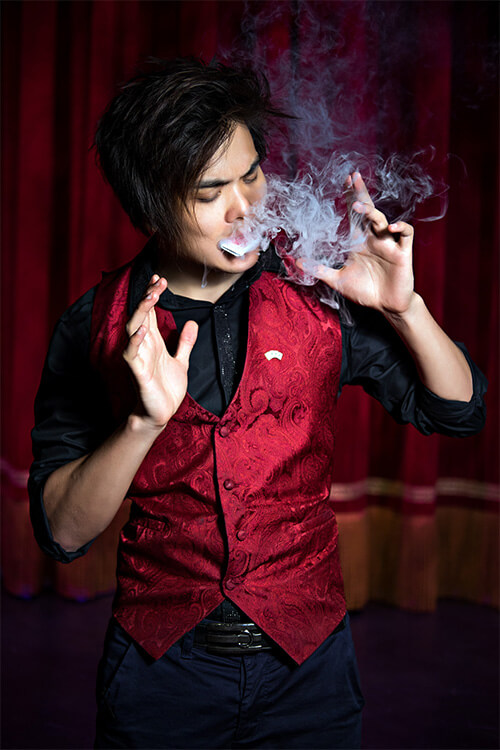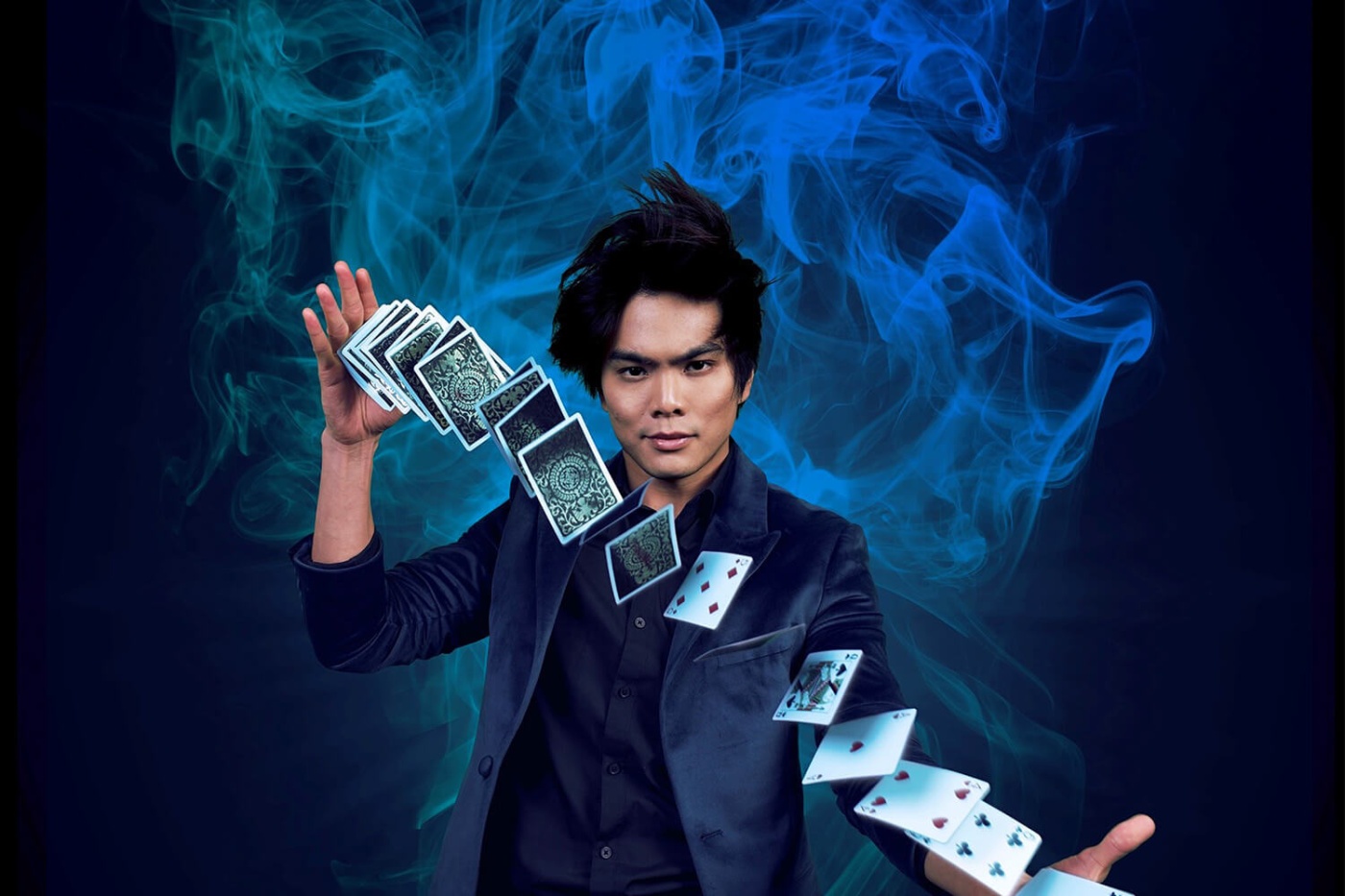Meet Shin Lim, the Magician Who Wowed America
World-famous illusionist Shin Lim, with his characteristic tousled hair and boyish charm, hopes to redefine the way close-up magic is presented. Like playing the piano, the 31-year-old crackerjack magician considers his craft to be an art form where he meticulously choreographs routines that focus on movement and dexterity, rather than flamboyant, over-the-top displays. In general, he eschews trite clichés of a magic show: no white rabbits yanked out of a top hat, voluptuous females sawed into half or perilous water torture cells.
What Lim is most known for, is his sleight of hand work and marvellous feats of prestidigitation involving a deck of cards. With a brilliant display of skill and stage presence, Lim has not only become the first person to win America’s Got Talent (AGT) twice in a row—season 13 and AGT: The Champions, but also the approbation of many; a compilation video on YouTube of all his scintillating performances on AGT 2018 chalked up a whopping 56 million views. Following his success on AGT: The Champions, Lim began a long-term residency at The Mirage Hotel in Las Vegas in 2019, and after many successful runs, is once again stepping back into the spotlight to perform his acclaimed show, ‘Limitless.’
Despite his busy schedule, Lim took the time to chat about his craft, the preparation that goes into each performance and the most memorable moments of his career.
High Net Worth: What draws you to magic?
Shin Lim: The same way music makes me feel, the emotions that it can bring out; whether it’s happiness, sadness, or inspiration. Even a great film can bring out moments of suspense and shock. These are feelings that can be brought out in people through magic, and that’s why I love to share it with others.
When did you realise that you could turn your passion into a career?
I realised at the age of 25 that I could make a living doing magic.
You were attracted to music from a young age and even contemplated becoming a pianist. Why didn’t you pursue that?
I was on my way to getting a university degree in piano performance, but in my first year of school, I developed severe carpal tunnel on both my wrists. The doctor at the university who diagnosed me told me that both music and magic were too harsh on my wrists, and that I should take a break from playing the piano for a while. That was when I chose to give magic a shot professionally.
Can you talk us through the creative process of coming up with each act?
It’s always different. Sometimes I can create an entire act in one day, and sometimes it’s one year. It always varies based on what type of magic and how familiar I am with the plot.
How do you come up with such interesting names for your routines?
I never really thought much about naming my acts, so I never took it seriously, hence the random funny and interesting names.
You are revered for your incredible use of card manipulation and sleight of hand. Can you speak more about your signature routine (52 Shades of Red) and how you conceptualised it?
This act was created in one day. In 2012, I was about to go on a China tour when the tour manager asked me if I had another eight-minute-long silent act. A silent act refers to an act done to music with no talking whatsoever. I immediately said ‘yes,’ even though I didn’t have one yet! The flight to China was the following day, so I quickly thought of a really visual act that was straightforward and to the point.
In 2011, you sold your first trick. How were you able to monetise it?
In magic, there are performers and also teachers. And the majority of teaching is via video or online. I actually learnt 90 per cent of my basic sleights and foundation from online websites and even YouTube. When a magician teaches a trick online to other young up-and-coming magicians, they usually sell it as a download for about US$5 to US$9. It’s a fair exchange for learning a new secret move, and it really helps the younger generation to pick up magic skills from their computers.
What is the world of magic competitions like for those not in the scene? In 2015, you became the champion of close-up magic at the Fédération Internationale des Sociétés Magiques World Championship of Magic.
The FISM World Championship of Magic is known to be the “Olympics” of magic. After winning first place in 2015, I didn’t want to compete in FISM ever again because it was the most terrifying experience. The entire audience was filled with 3,000 to 4,000 professional magicians—peers who I’ve looked up to or have known in the circle—and the judges were right in front of me. It was quite intimidating, more so than any other competition shows I’d done before or after.

Three years later, you won America’s Got Talent. I am sure it was a career-defining moment in your life. How did it change you?
AGT was a great experience for me. I think it was a stepping stone that allowed me to share my style of magic with the masses. Since winning, it has opened many opportunities—one of them being a resident at The Mirage Hotel & Casino.
Speaking about your long-term residency at The Mirage, what has the experience been like so far?
It is a dream come true, and I really hope I can keep performing there for as long as possible. I love working there.
Simon Cowell told you that he wanted you to be more of a showman and to “take it off the table.”As an artist, is performance or skill/technique more important?
I believe this principle probably applies to most art forms. The Sleight of Hand is only about 10 to 20 per cent of the overall importance of the act. What carries more weight is the story, atmosphere, your look (that is something taken into account and graded at FISM), music (how well I’ve synchronised my music with the act), and sometimes comedy (my style, however, doesn’t usually include laughter or anything of that sort, but I know for others it’s quite important). If you’re an illusionist, lighting, prop management, movement and dancing are factors too.
In the past, you had a fair bit of narration accompanying your acts. Now, you are known for performing in silence. Does it change the performance in any way?
Yes and no. I’m always playing with talking versus silent acts, and seeing how to mix the two together so that they complement each other. In terms of the way I perform, yes it’s very different when it’s talking versus being silent. Talking is more relaxed and there is no time limit. Silent acts are very strict with time. It always begins and ends at the exact same time—and the magic has more manipulation.
Lastly, what do you reckon is your most dangerous trick to date? You had a rather life-changing injury in 2016, involving two tendons in your left thumb while rehearsing a new trick.
My most dangerous trick would be the crossbow act that severed two of my thumb tendons in my left hand. I was being careless and wasn’t concentrating properly, so that’s how I ended up cutting those tendons.


